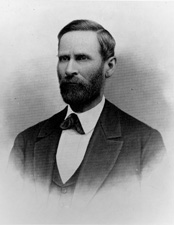Waldo P. Johnson
| Waldo Johnson | |
|---|---|
 |
|
|
Confederate States Senator from Missouri |
|
|
In office December 24, 1863 – May 10, 1865 |
|
| Preceded by | Robert Peyton |
| Succeeded by | Constituency abolished |
|
United States Senator from Missouri |
|
|
In office March 17, 1861 – January 10, 1862 |
|
| Preceded by | James Green |
| Succeeded by | Robert Wilson |
| Member of the Missouri House of Representatives | |
|
In office 1847-1848 |
|
| Personal details | |
| Born |
September 16, 1817 Bridgeport, Virginia, U.S. (now West Virginia) |
| Died | August 14, 1885 (aged 67) Osceola, Missouri, U.S. |
| Political party | Democratic |
| Alma mater | Rector College |
| Military service | |
| Allegiance |
|
| Service/branch |
|
| Unit |
|
| Battles/wars |
Mexican-American War American Civil War |
Waldo Porter Johnson (September 16, 1817 – August 14, 1885) was a United States Senator from Missouri, and later a member of the Confederate Congress during the American Civil War.
Born in Bridgeport, Virginia, he attended public and private schools, graduated from Rector College (Pruntytown, Virginia) in 1839. He studied law and was admitted to the bar, commencing practice in Harrison County, Virginia in 1841. He moved to Osceola, Missouri in 1842 and continued the practice of law, and served in the Mexican-American War as a member of the First Missouri Regiment of Mounted Volunteers. In 1847 he was a member of the Missouri House of Representatives and was elected circuit attorney in 1848 and judge of the seventh judicial circuit in 1851. He resigned in 1852 and resumed the practice of law.
Johnson was a member of the peace convention of 1861 held in Washington, D.C., in an effort to devise means to prevent the impending war; he was elected as a Democrat to the U.S. Senate and served from March 17, 1861, to January 10, 1862, when he was expelled from the Senate for disloyalty to the government. He served in the Confederate Army during the Civil War and attained the rank of lieutenant colonel of the Fourth Missouri Infantry, and was appointed a member of the Senate of the Confederate States to fill a vacancy.
...
Wikipedia
